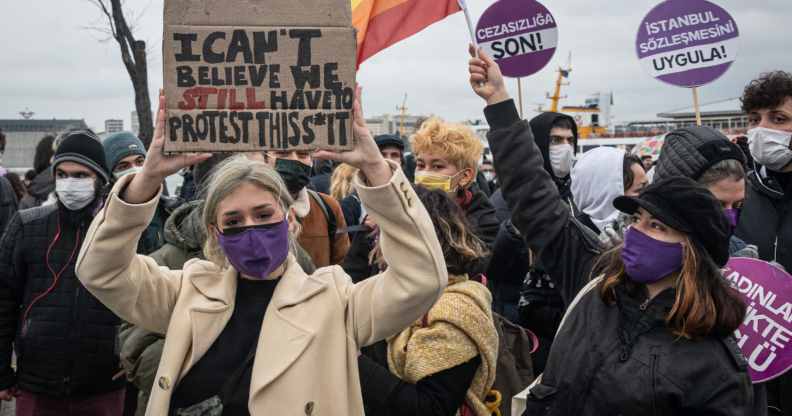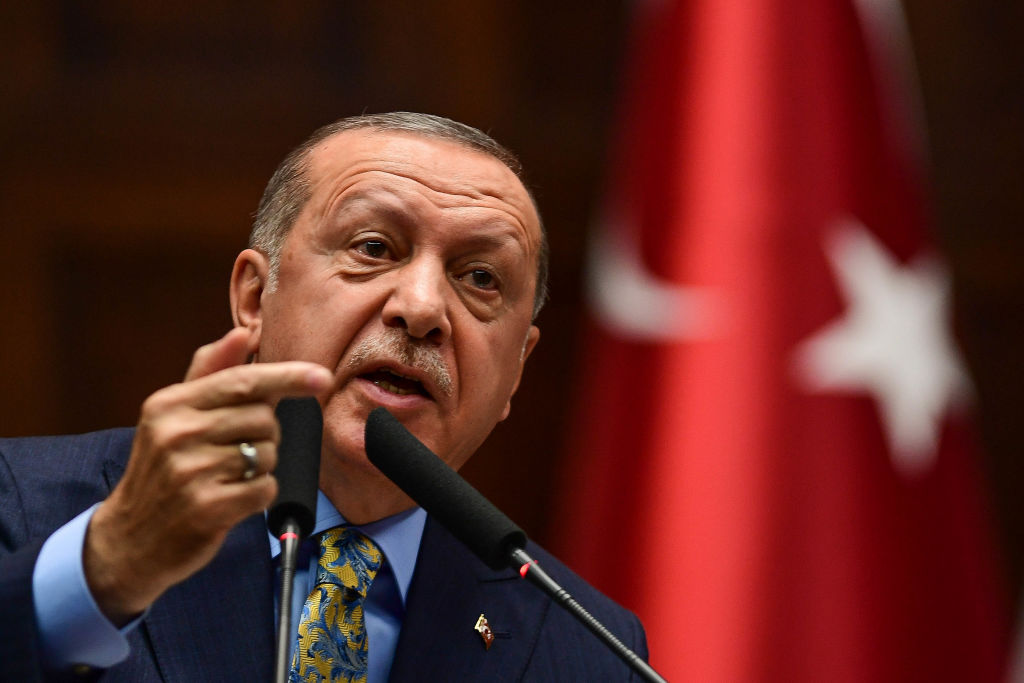Turkey quits landmark Istanbul Convention because it ‘normalises homosexuality’

Demonstrators gathered in the Kadikoy district of Istanbul, Turkey, to protest against president Recep Tayyip Erdogan’s decision to leave the Istanbul Convention. (Diego Cupolo/NurPhoto via Getty Images)
Turkey severed ties from the landmark Istanbul Convention, which intended to tackle violence against women, midnight Saturday (20 March) because it “normalises homosexuality”.
The pact was signed in Istanbul a decade ago as part of an international effort to prevent, prosecute and eliminate domestic violence.
But in the latest example of Turkey’s right-wing leadership yawning an ever-widening gap between it and the rest of the West, president Recep Erdoğan abandoned the agreement altogether in a surprise executive order, the BBC reported.
It was a sudden move that left advocacy groups stunned, already reeling from the years-long rise in the abuse of women in Turkey. Thousands took to the streets in protest Saturday as a result.
While the Directorate of Communications, a state promotions agency, sought to stress that the move had to be done.
The treaty, it said in a statement Sunday, clashed with so-called family values as it “normalised homosexuality“.
“The Istanbul Convention, originally intended to promote women’s rights, was hijacked by a group of people attempting to normalise homosexuality – which is incompatible with Türkiye’s social and family values,” it said.
“Hence the decision to withdraw.”
It’s the latest example of the growing hostility Turkey’s leaders have shown towards LGBT+ people, as a hatred that once festered has been allowed to become the norm.
Turkey pulling out of Istanbul Convention is a ‘setback’, says human rights chief
The Istanbul Convention was brokered by the 47 member-strong Council of Europe, a human rights organisation, as countless countries pledged to do more to tackle gendered violence. It does not carry the force of law.
But while Turkey was among its first signatories, Erdoğan has floated the idea of ditching the agreement for at least a year, with officials suggesting the government intended to do so in 2020.
The rumours of Turkey leaving the treaty amid the coronavirus pandemic sparked seismic demonstrations at the time.

Turkish President Recep Tayyip Erdogan. (Getty)
And for Turks on Saturday, a sense of déjà vu as once again thousands for people stormed the streets of Istanbul, urging Erdoğan to reconsider his overnight decree annulling Turkey’s ratification of the convention.
Many rallied under the slogan “Withdraw the decision, implement the treaty”, France24 reported.
The Council of Europe’s secretary general, Marija Pejčinović Burić, dubbed the decision as “devastating” in a statement.
“This move is a huge setback to these efforts and all the more deplorable because it compromises the protection of women in Turkey, across Europe and beyond,” she said.
After all, violence against women in the country has been soaring for years.
More than 400 women were murdered by male partners in 2018. Four out of 10 women suffer sexual or physical violence at least once in their lives, researchers say.
It comes after Poland pulled out of the Istanbul Convention last year, reportedly filling the vacuum in women’s rights with its own treaty that instead bans abortion and marriage equality.

